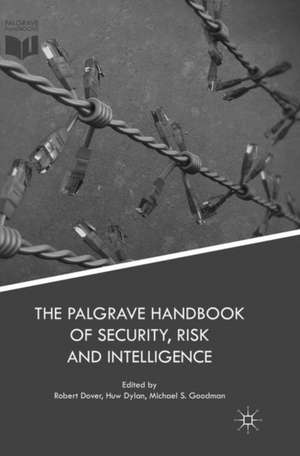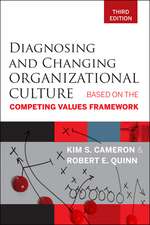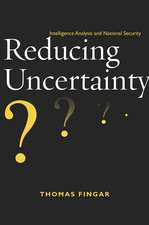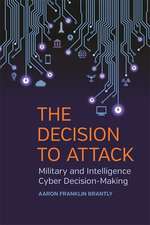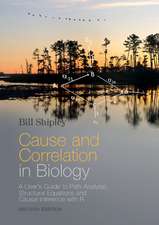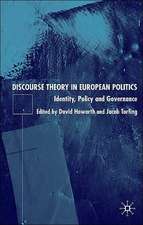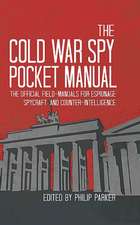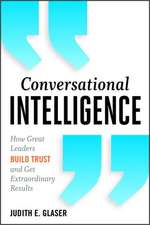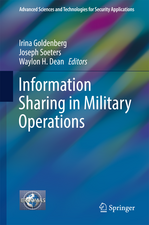The Palgrave Handbook of Security, Risk and Intelligence
Editat de Robert Dover, Huw Dylan, Michael S. Goodmanen Limba Engleză Paperback – 29 iul 2018
| Toate formatele și edițiile | Preț | Express |
|---|---|---|
| Paperback (1) | 1260.40 lei 38-44 zile | |
| Palgrave Macmillan UK – 29 iul 2018 | 1260.40 lei 38-44 zile | |
| Hardback (1) | 1678.24 lei 43-57 zile | |
| Palgrave Macmillan UK – 17 iul 2017 | 1678.24 lei 43-57 zile |
Preț: 1260.40 lei
Preț vechi: 1385.06 lei
-9% Nou
Puncte Express: 1891
Preț estimativ în valută:
241.20€ • 250.29$ • 201.61£
241.20€ • 250.29$ • 201.61£
Carte tipărită la comandă
Livrare economică 12-18 martie
Preluare comenzi: 021 569.72.76
Specificații
ISBN-13: 9781349953875
ISBN-10: 1349953873
Pagini: 501
Ilustrații: XV, 501 p. 10 illus.
Dimensiuni: 155 x 235 mm
Greutate: 0.79 kg
Ediția:Softcover reprint of the original 1st ed. 2017
Editura: Palgrave Macmillan UK
Colecția Palgrave Macmillan
Locul publicării:London, United Kingdom
ISBN-10: 1349953873
Pagini: 501
Ilustrații: XV, 501 p. 10 illus.
Dimensiuni: 155 x 235 mm
Greutate: 0.79 kg
Ediția:Softcover reprint of the original 1st ed. 2017
Editura: Palgrave Macmillan UK
Colecția Palgrave Macmillan
Locul publicării:London, United Kingdom
Cuprins
Part One: The Changing Nature of Conflict and Crises.- Chapter 1:‘Rapid Urbanisation and Security: Holistic Approach to Enhancing Security of Urban Spaces’ Ksenia Chmutina & Lee Bosher.- Chapter 2: ‘Energy Security’ Petra Dolata.- Chapter 3: ‘Evolving Biosecurity Frameworks’ Caitriona McLeish.- Chapter 4:‘Resilience and National Security’ Gail Ridley.- Chapter 5: 'Proxy Wars and the Contemporary Security Environment’ Andrew Mumford & Vladimir Rauta.- Chapter 6: ‘Resilience and Critical Infrastructure: Origins, Theories and Critiques’ Chris Zebrowski.- Chapter 7: ‘Intelligence and Organised Crime – Paradigms and Paradoxes’ John Buckley.- Part Two: The Changing Nature of Technology.- Chapter 8:‘Cyber Security’ Scott Jasper & James Wirtz.- Chapter 9:‘Securing State Secrets’ Patrick F Walsh.- Chapter 10: ‘The Rise of Smart Machines: The Unique Peril of Intelligence Software Agents in Defense and Intelligence’ Nina A Kollars.- Chapter 11: ‘The More Thing Change: Humint in the Digital Age’ David V Gioe.- Chapter 12: ‘Drones – Opportunities, Threats and Challenges’ Peter Lee.- Chapter 13: ‘Invisible Battlegrounds: On Force and Revolutions, Military and Otherwise’ Michael Warner.- Part Three: The Changing Nature of Intelligence.- Chapter 14: ‘Globalisation and Intelligence’ Zakia Shiraz.- Chapter 15: ‘Capacity Building and Security Sector Reform’ Paul Jackson.- Chapter 16: ‘Privatisation’ Damien Van Puyvelde.- Chapter 17: ‘Criminality, Terrorism and the Changing Nature of Conflict’ Angela Gendron.- Chapter 18: ‘Secret Interventions and Clandestine Diplomacy’ Huw Dylan.- Chapter 19: ‘Social Media Intelligence (SOCMINT)’ David Omand.- Chapter 20: ‘Corporate Intelligence’ Arthur Weiss.- Part Four: The Changing Nature of Governance in the Developed World.- Chapter 21: ‘The Ethics of Intelligence’ Ross Bellaby.- Chapter 22: ‘Risk, Security and International Law’ Robert Dover.- Chapter 23: ‘The Changing Media’ Peter Busch.- Chapter 24: ‘Terrorism and the News Media: Symbiosis, Control and Framing’ Alexander Spencer.- Chapter 25: ‘Two Worlds, One Common Pursuit: Why Greater Engagement with the Academic Community Could Benefit the UK’s National Security’ Robert Dover, Michael S Goodman & Martha White.- Chapter 26: ‘The Ethics of Whistle-blowing, Leaking and Disclosure’ Seumas Miller.
Notă biografică
Huw Dylan is a Lecturer in Intelligence and International Security at the Department of War Studies, King’s College London. His research is focused on British intelligence in the Cold War, and his book Defence Intelligence and the Cold War was published in Autumn 2014 with Oxford University Press.
Michael S. Goodman is Professor of Intelligence and International Affairs in the Department of War Studies, King’s College London. He is also Visiting Professor at the Norwegian Defence Intelligence School. His most recent work is the 2-volume Official History of the Joint Intelligence Committee.
Robert Dover is Senior Lecturer in Intelligence and International Relations in the Department of Politics and International Relations at the University of Leicester. His research and publications are focused on governmental uses of intelligence, the defence industrial base, and trade as a facet of power.
Michael S. Goodman is Professor of Intelligence and International Affairs in the Department of War Studies, King’s College London. He is also Visiting Professor at the Norwegian Defence Intelligence School. His most recent work is the 2-volume Official History of the Joint Intelligence Committee.
Robert Dover is Senior Lecturer in Intelligence and International Relations in the Department of Politics and International Relations at the University of Leicester. His research and publications are focused on governmental uses of intelligence, the defence industrial base, and trade as a facet of power.
Textul de pe ultima copertă
This handbook provides a detailed analysis of threats and risk in the international system and of how governments and their intelligence services must adapt and function in order to manage the evolving security environment. This environment, now and for the foreseeable future, is characterised by complexity. The development of disruptive digital technologies; the vulnerability of critical national infrastructure; asymmetric threats such as terrorism; the privatisation of national intelligence capabilities: all have far reaching implications for security and risk management. The leading academics and practitioners who have contributed to this handbook have all done so with the objective of cutting through the complexity, and providing insight on the most pressing security, intelligence, and risk factors today. They explore the changing nature of conflict and crises; interaction of the global with the local; the impact of technological; the proliferation of hostile ideologies and the challenge this poses to traditional models of intelligence; and the impact of all these factors on governance and ethical frameworks. The handbook is an invaluable resource for students and professionals concerned with contemporary security and how national intelligence must adapt to remain effective.
Caracteristici
Provides a detailed analysis of the current risks and threats present in the international system
Offers a truly global reach; discusses military challenges developing across the world
Dovetails risk, security and intelligence - three topics which are usually standalone
Offers a truly global reach; discusses military challenges developing across the world
Dovetails risk, security and intelligence - three topics which are usually standalone
